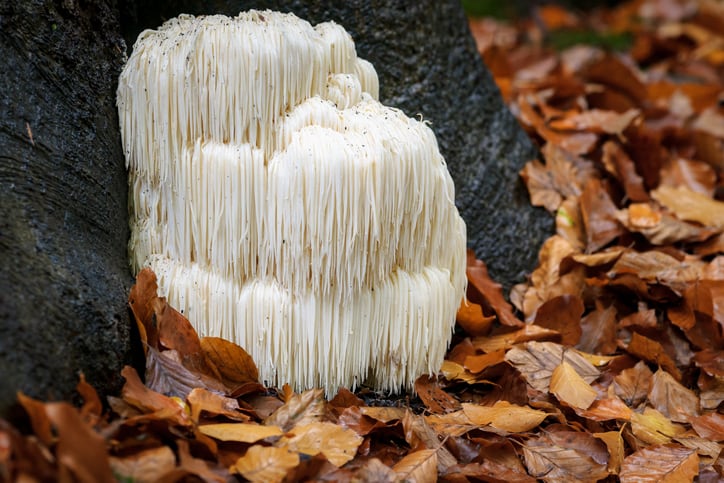Participant’s scores on cognitive tests assessing attention and processing were observed to be significantly improved 48-hours after intakes of the Hericium erinaceus mushroom, whilst subjective stress levels were notably reduced following the 28-day intervention.
The UK-based researchers conclude: “The findings tentatively suggest that Hericium erinaceus may improve speed of performance and reduce subjective stress in healthy, young adults.”
“This is the first study to demonstrate cognitive benefits of H. erinaceus in a young, healthy sample following a single dose of H. erinaceus, thus adding to the growing body of literature which has shown cognitive improvements following chronic supplementation in older adults with diagnosed mild cognitive impairment and mild Alzheimer’s disease and no cognitive impairments," they stress.
Mushrooms and cognition
There has been significant recent interest in the health properties of the edible mushroom Hericium erinaceus (Lion’s Mane), due to the presence of numerous bioactive compounds within the mycelia and fruiting bodies such as polysaccharides and phenolic acids.
Whilst its antioxidant and antimicrobial properties have been widely documented, more recently there has been interest in its potential neuroprotective and neuroregenerative properties. This has been attributed to hericenones and erinacines compounds which can easily cross the blood-brain barrier, to potentially promote nerve growth factor synthesis and section.
Previous studies have observed memory and mood enhancements following intakes of Lion’s Mane, whilst associations have been noted with cognitive improvements. Thus, the potential for the mushroom to elicit cognitive and mood effects has been established to be strong.
Yet, RCTs assessing the overall neurological outcomes associated with Lion’s Mane are limited, with older demographics more frequently studied. The present study sought to bridge this gap in understanding the cognitive and mood-enhancing effects of H. erinaceus by investigating young, health adults without cognitive decline, to conclude on its potential as a natural preventative measure.
Study
The researchers recruited 41 healthy adults aged 18-45 years, who were randomised into a placebo group or treatment group. The treatment group were administered three capsules (SO-DSX1, Sempera Organics Inc.) daily, each containing 600mg of lion’s main mushroom, equating to a daily dose of 1.8g.
The acute and chronic effects of 1.8g H. erinaceus were assessed through measuring cognitive function after 48 hours and 28-days of intervention. Cognitive function was assessed through tests delivered via the Computerised Mental Performance Assessment System (COMPASS). Associated tasks included immediate and delayed word recall, numeric working memory, choice reaction time, Stroop task, peg and ball, delayed word recognition. These measured attention, executive function, working memory and episodic memory performance. Long-term stress levels were established using Stress Visual Analogue Scales.
It was observed that participants performed significantly quicker on the Stroop task at 60 minutes post intake. Furthermore, a trend was established towards reduced subjective stress levels following the 28-day supplementation period, when compared to both the placebo group and day 1 scores.
Explained
The researchers conclude that the findings may suggest that H. erinaceus may improve performance speed and exert a stress-reduction effect.
They hypothesise: “When considering mechanisms that may underlie this effect, it is well established that BDNF regulates synaptic plasticity and processes related to learning and memory consolidation; however, there is less evidence pertaining to other areas of cognitive function.”
“There are several mechanisms of action that might underpin the mood effects of H. erinaceus, namely that several bioactive compounds of H. erinaceus can stimulate the expression of neurotrophic factors including nerve growth factor,” they add, regarding the reported reduction in stress levels.
Yet, the report emphasises the need for further research investigating the effects of the mushroom to include larger sample sizes to improve validity and reliability of the findings.
Seeking a mental edge
The study's findings were welcomed by Nirmal Nair, CEO and Founder of Sempera Organics, which provided the products used in the study. “The findings suggest that SO-DSX1® may improve speed of performance and reduce subjective stress in healthy, young adults,” said Nair. “Therefore, we believe that our proprietary SO-DSX1® blend would be a perfect ingredient for cognitive performance supplements and beverages aimed at younger adults who are seeking a mental edge in work/career and in gaming.”
Source: Nutrients
https://doi.org/10.3390/nu15224842
“The Acute and Chronic Effects of Lion’s Mane Mushroom Supplementation on Cognitive Function, Stress and Mood in Young Adults: A Double-Blind, Parallel Groups, Pilot Study”
Authors: S. Docherty, et al.

